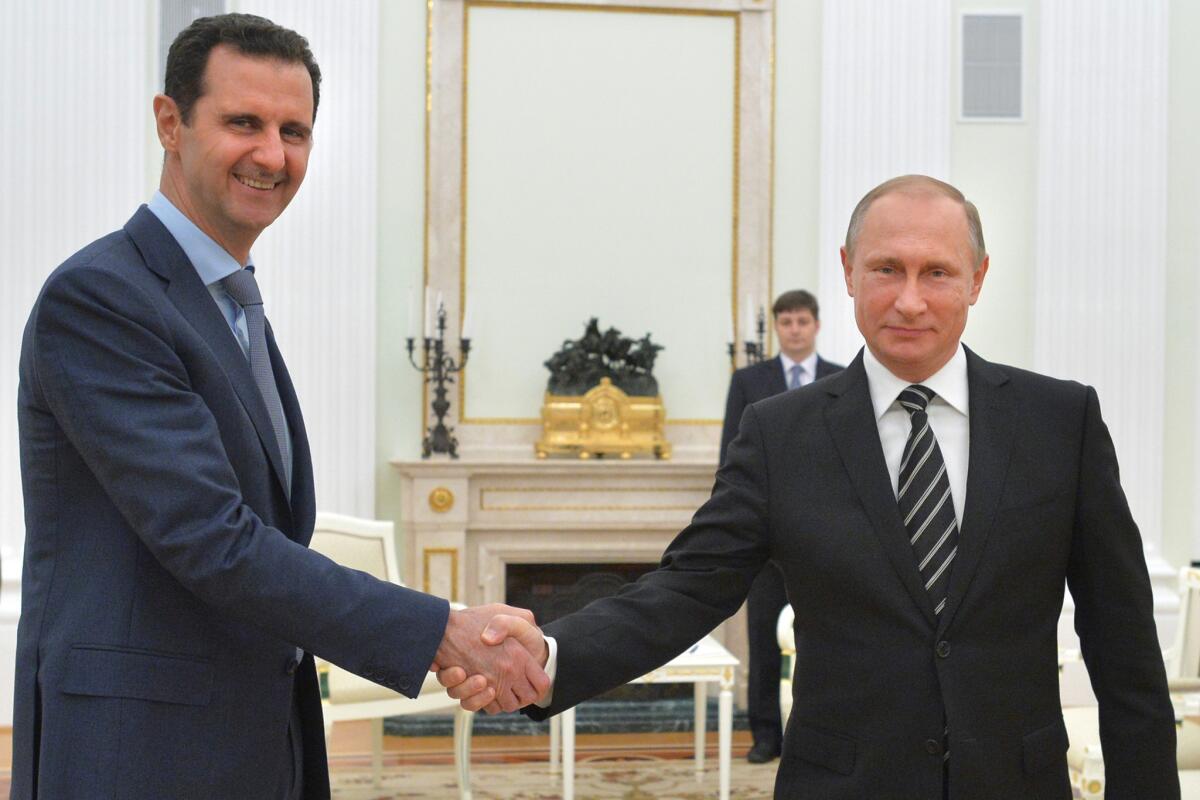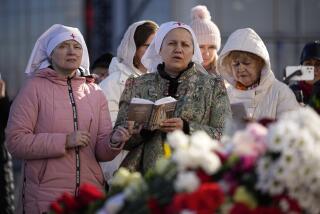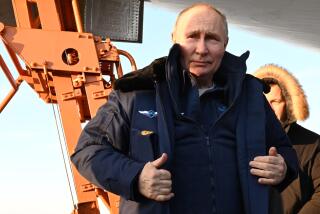Syrian President Assad meets with Vladimir Putin in Moscow to discuss military operations

Syrian President Bashar Assad met with Russian President Vladimir Putin in Moscow.
Syrian President Bashar Assad made a surprise visit to Moscow for talks with Russian President Vladimir Putin, Russian and Syrian news media reported Wednesday, as Russian jets continued to pound opposition strongholds in the war-ravaged Middle Eastern nation.
The meeting, which took place late Tuesday, according to media accounts, was only announced early Wednesday as part of an apparent effort to maintain some hours of secrecy.
It was Assad’s first publicly announced trip outside Syria since the armed rebellion against his rule erupted in 2011. Moscow has long been a chief ally of Assad and last month significantly escalated its aid, launching an intensive aerial bombing campaign in Syria against antigovernment insurgents — including some groups that reportedly receive clandestine support from the CIA.
Moscow says its warplanes are solely targeting terrorists in Syria, including various Al Qaeda-linked extremists who have come to dominate the armed opposition.
See the most-read stories this hour >>
Washington has condemned the Russian aerial offensive in Syria as counterproductive and “doomed to failure,” in the words of President Obama.
In Moscow, Assad and Putin discussed the military situation in Syria and agreed that a political solution is urgently needed to end the conflict, Russian news agencies reported.
“Naturally, the talks focused on fighting terrorist extremist groups, carrying on with the Russian operation, and support for the Syrian army’s offensive,” Kremlin spokesman Dmitry Peskov told journalists in Moscow on Wednesday, according to Russia’s RT news service.
On Russian television, Putin lauded Syria’s role.
“The Syrian people practically by themselves have been fending off and fighting against terrorism for several years,” Putin said.
Images on TV showed Assad speaking with Putin in a formal gathering that included several other high-level Russian officials, such as Foreign Minister Sergei Lavrov.
The U.S. State Department said Wednesday that Secretary of State John F. Kerry would meet Friday in Vienna with Lavrov and their counterparts from Turkey and Saudi Arabia. The conflict in Syria was expected to be high on the agenda.
Whether the top-level meetings would result in a new peace initiative for Syria remained unclear.
U.S. officials maintain that Assad has been a magnet for terrorism and must leave office before any permanent political resolution can be reached. Recently, Washington has modified its stance and said Assad could remain for an unspecified but limited period as part of a negotiated transition government.
Officials in Moscow and Damascus say the Russian campaign has been a major boost for the Syrian military. Pro-government forces in Syria suffered significant territorial losses earlier this year to various opposition groups, including Islamic State, the breakaway Al Qaeda faction that is being targeted by a separate, U.S.-led air bombardment campaign.
The Syrian army, backed by Russian airstrikes, has in recent weeks launched ground assaults in key strategic areas of western Syria, including in coastal Latakia, where Russia has refurbished an air base as a platform for its campaign. Russia is coordinating its attacks with Damascus, which says it requested Moscow’s military aid.
With Russian air support, Syria says, its forces have also been pushing back “terrorists” outside Damascus, the capital; in Homs, Hama and Idlib provinces to the north; and in the vicinity of the northern city of Aleppo, which has long been divided between government and opposition control.
Assisting Syrian ground troops are hundreds of military advisors from Iran, another key backer of Assad, and thousands of militiamen from Hezbollah, the Lebanese-based group allied with Iran.
Russian officials have said the air operation would last several months, but have not set a precise date for its conclusion. Russia says it has no intention of sending ground forces.
Since Moscow’s air onslaught began Sept. 30, Russian and Syrian officials say, Russian aircraft and guided missiles have hit scores of “terrorist” targets, including ammo dumps, bomb-making factories, underground bunkers, gun emplacements, headquarter compounds and armed vehicles.
U.S. officials have voiced concern that Russian attacks are striking moderate rebel factions, including some backed by the United States and its allies. Saudi Arabia, Turkey, Qatar and other U.S. partners have provided substantial military aid to those rebels and have denied arming terrorist fighters in Syria.
The Russian air campaign appears to have injected new urgency into long-stalled initiatives to craft a political solution to the Syrian war, which has cost more than 200,000 lives, left much of the country in ruins and forced more than 4 million into exile. A wave of refugees from Syria and elsewhere into Europe has triggered a crisis in some European nations and resulted in calls from U.S. allies to ramp up efforts for peace talks.
Twitter: @mcdneville
Staff writer Paul Richter in Washington contributed to this report.
ALSO:
U.N. chief appeals for calm in Israel, but violence flares again
Mexico to relaunch search for 43 college students who disappeared last year
Britain welcomes China’s Xi Jinping despite protests and Prince Charles’ early exit
More to Read
Start your day right
Sign up for Essential California for news, features and recommendations from the L.A. Times and beyond in your inbox six days a week.
You may occasionally receive promotional content from the Los Angeles Times.






